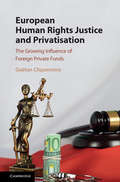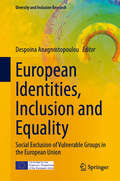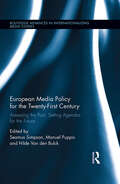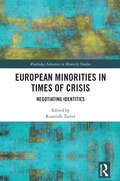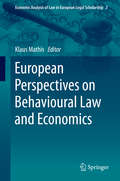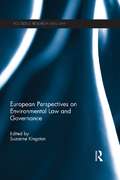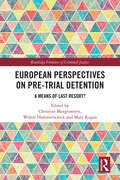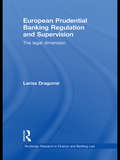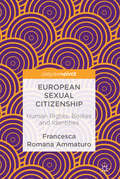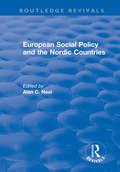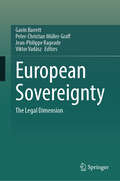- Table View
- List View
European Human Rights Justice and Privatisation: The Growing Influence of Foreign Private Funds
by Gaëtan CliquennoisWith the decline of public funding and new strategies pursued by interest groups, foreign private foundations and donors have become growing contributors to the European human rights justice system. These groups have created their own litigation teams, have increasingly funded NGOs litigating the European Courts, and have contributed to the content and supervision of the European judgements, which all have direct effects on the growth and procedure of human rights. European Human Rights Justice and Privatisation analyses the impacts of this private influence and the resultant effects on international relations between states, including the orientation of European jurisprudence towards Eastern countries and the promotion of private and neo-liberal interests. This book looks at the direct and indirect threat of this private influence on the independency of the European justice and on the protection of human rights in Europe.
European Identities, Inclusion and Equality: Social Exclusion of Vulnerable Groups in the European Union (Diversity and Inclusion Research)
by Despoina AnagnostopoulouThe volume takes an interdisciplinary and intersectional approach to recent trends in European identities, social exclusion and poverty on the one hand, and social rights and equality legislation and policies in the European Union on the other. It examines whether legal instruments and policies can effectively address structural discrimination and social exclusion, explores their interplay with identity politics and stereotypes, and examines how legal principles and policies translate into societal progress and inclusion at both the EU and national levels. The book highlights the social rights safeguarded in the European Pillar of Social Rights, the EU Charter of Fundamental Rights and the Council of Europe's European Social Charter, as well as the role of EU and national courts in interpreting social rights and non-discrimination legislation. Using case studies from Greece, Italy and Spain, the book examines state and civil society initiatives to combat poverty and marginalization. The book will appeal to students, researchers and academics in political science, law, sociology and education, as well as policy-makers and practitioners interested in equality and social policies aimed at combating social exclusion, marginalization and poverty.
European Insurance Law within the Digital Age (AIDA Europe Research Series on Insurance Law and Regulation #14)
by Cristina Poncibò Piotr TereszkiewiczThis edited volume examines how recent technological innovations are transforming European insurance law, focusing on critical issues such as transparency, information duties, fairness, and the regulation of insurance contracts for both professional and private policyholders. While new business models, like digital platforms and robo-advisory services, are rapidly emerging, European law has yet to provide a sufficiently tailored regulatory response. The current sectoral framework, notably Directive (EU) 2016/97 on insurance distribution (IDD), offers a general, principle-based approach, but lacks the specificity needed to effectively address innovative digital insurance distribution models. In parallel, broader regulatory initiatives such as the EU Artificial Intelligence Act (EU AI Act) and the Digital Services Act (DSA) are poised to reshape the digital insurance ecosystem. The EU AI Act introduces horizontal rules governing AI systems, including those used in automated underwriting, risk profiling, and robo-advisory services, thereby directly affecting the design and accountability of algorithmic tools in insurance distribution, especially those deemed high-risk. The DSA imposes new responsibilities on digital platforms, with potential implications for InsurTech firms acting as intermediaries or aggregators. Additionally, there is ongoing uncertainty as to whether existing consumer protection instrument, such as the Unfair Contract Terms Directive (93/13/EEC), the Unfair Commercial Practices Directive (2005/29/EC), and the Omnibus Directive (2019/2161/EC), are sufficient to address the novel risks and challenges posed by digital insurance services. Meanwhile, regulatory guidance from supervisory bodies such as EIOPA and national authorities is increasingly addressing InsurTech-related legal questions in a more targeted manner. By providing a normative and comparative legal analysis, this volume addresses a significant gap in current scholarship. It calls on legal scholars and insurance experts to reassess the role of technology in shaping EU insurance law and to reflect on whether the regulatory principle of technological neutrality remains viable. Ultimately, the book argues for an integrated regulatory approach that aligns socio-technical governance with the specific demands of insurance law, ensuring effective consumer protection in an increasingly digital landscape.
European Intellectual Property Law (European Business Law Library)
by Terence PrimeThis title was first published in 2000: European Intellectual Property is a survey and discussion of the impact of the economic principles of the European Community, upon the legal regime for the protection of intellectual property rights within the Community and the laws of its Member States. Beginning with a discussion of the issues arising from the treaty itself and the efforts of both the European Court of Justice and the European Commission through the liberalization of licensing procedures to meet these specific issues, the survey goes on to consider the attempts to achieve harmonization of national laws in the fields of trade marks, patents, industrial design and the wider efforts to create Community wide intellectual property rights.
European International Law Traditions
by Peter HilpoldInternational Law is usually considered, at least initially, to be a unitary legal order that is not subject to different national approaches. Ex definition it should be an order that transcends the national, and one that merges national perspectives into a higher understanding of law. It gains broad recognition precisely because it gives expression to a common consensus transcending national positions.The reality, however, is quite different. Individual countries’ approaches to International Law, and the meanings attached to different concepts, often diverge considerably. The result is a lack of comprehension that can ultimately lead to outright conflicts.In this book, several renowned international lawyers engage in an enquiry directed at sorting out how different European nations have contributed to the development of International Law, and how various national approaches to International Law differ. In doing so, their goal is to promote a better understanding of theory and practice in International Law.
European Investigation Order: Where the Law Meets the Technology (Law, Governance and Technology Series #55)
by Maria Angela Biasiotti Fabrizio TurchiIn the era of globalisation, cross-border crimes are becoming increasingly common. The nature of these crimes is complex, and cross-border evidence exchange is, therefore, crucial to the successful prosecution of these offences. The exchange of evidence between countries can provide invaluable assistance in solving crimes that have an international dimension. The European Investigation Order (EIO) allows judicial authorities to request evidence more quickly and easily than via traditional instruments. The EIO has become the primary legal tool for gathering trans-border evidence, replacing the traditional Mutual Legal Assistance (MLA) conventions previously used. However, the EIO is not the only pertinent legal instrument for cross-border evidence gathering within the EU. Accordingly, professionals need a clear understanding of this subject.Exchanging evidence among judicial authorities in the EU Member States presupposes two essential components. First, there must be a secure communication channel. This is provided by e-CODEX, which offers a European digital infrastructure for secure cross-border communication in the field of justice. Recently (May 30th, 2022), the e-CODEX system became the digital backbone of EU judicial cooperation in civil and criminal matters on the basis of Regulation 2022/850. To achieve effective evidence exchange via EIO/MLA legal instruments, there must also be a communication tool. This is provided by the e-Evidence Digital Exchange System, which is capable of managing any EIO/MLA procedures/instruments, from the e-Forms (EIO Annexes) to the whole business logic, on the basis of the e-CODEX system. Finally, it is essential to use a uniform standard for the representation of evidence data and metadata, so as to streamline the process and make investigations more effective, in particular when it comes to complicated criminal cases where it is key to find either correlations among different cases or to extract multiple types of data from the same inspection. The importance of cross-border evidence exchange in criminal matters cannot be overstated. This book addresses all the above-mentioned aspects, offering an up-to-date overview of scenarios in cross-border judicial cooperation from both juridical and technical standpoints.
European Labour Law
by Brian BercussonEuropean Labour Law explores how individual European national legal systems, in symbiosis with the European Union, produce a transnational labour law system that is distinct and genuinely European in character. Professor Brian Bercusson describes the evolution of this system, its national, transnational and global contexts and its institutional and substantive structures. The collective industrial-relations dimension of employment is examined, and the labour law of the EU as manifested in, for example, European works councils is analysed. Important subjects which have traditionally received little attention in some European labour law systems are covered, for example, the fragmentation of the workforce into atypical forms of employment. Attention is also given to the enforcement of European labour law through administrative or judicial mechanisms and the European social dialogue at intersectoral and sectoral levels. This new edition has been extensively updated, as the EU's influence on this area of social policy continues to grow.
European Legal Cultures in Transition
by Grødeland, Åse B. and Miller, William L. Åse B. Grødeland William L. MillerAre national legal cultures in Europe converging or diverging as a result of the pressures of European legal integration? Åse B. Grødeland and William L. Miller address this question by exploring the attitudes and perceptions of the general public and law professionals in five European countries: England, Norway, Bulgaria, Poland and the Ukraine. Presenting new findings, they challenge the established view that ordinary citizens and people working professionally with the law have different legal cultures. Their research in fact reveals that the attitudes of citizens in Eastern and Western Europe towards 'law-in-principle' are remarkably similar, whereas perceptions of 'law-in-practice' differ by country and often correlate with GDP per capita and country ranking in rule of law indices. Grødeland and Miller's innovative methodological approach will appeal to both experts and non-experts with an interest in legal culture, European integration, or European elite and public opinion.
European Legal History
by Randall Lesaffer Jan ArriensThe rediscovery of Roman law and the emergence of classical canon law around AD 1100 marked the beginnings of the civil law tradition in Europe. Between the twelfth and eighteenth centuries, a highly sophisticated legal science of a truly European dimension was developed. Since then the different European States have developed their own national legal systems, but with the exception of England and Ireland they are all heirs to this tradition of the ius commune. This historical introduction to the civil law tradition, from its original Roman roots to the present day, considers the political and cultural context of Europe's legal history. Political, diplomatic and constitutional developments are discussed, and the impacts of major cultural movements, such as scholasticism, humanism, the Enlightenment and Romanticism, on law and jurisprudence are highlighted. This contextual approach makes for a fascinating story, accessible to any reader regardless of legal or historical background.
European Media Policy for the Twenty-First Century: Assessing the Past, Setting Agendas for the Future (Routledge Advances in Internationalizing Media Studies)
by Seamus Simpson Manuel Puppis Hilde van den BulckMedia policy issues sit at the heart of the structure and functioning of media systems in Europe and beyond. This book brings together the work of a range of leading media policy scholars to provide inroads to a better understanding of how effective media policies can be developed to ensure a healthy communication sector that contributes to the wellbeing of individual citizens, as well as a more democratic society. Faced with a general atmosphere of disillusionment in the European project, one of the core questions tackled by the volume’s contributors is: what scope is there for European media policy that can exist beyond the national level? Uniquely, the volume’s chapters are structured around four key policy themes: media convergence; the continued role and position of public regulatory intervention in media policy; policy issues arising from the development of new electronic communication network environments; and lessons for European media policy from cases beyond the EU. In its chapters, the volume provides enriched understandings of the role and significance of policy actors, institutions, structures, instruments and processes in communication and media policy.
European Metropolitan Commercial Real Estate Markets
by Ed F. Nozeman Arno J. Van der VlistMetropolitan commercial real estate markets are highly influenced by global forces, the regional economy, and institutional behaviour. While descriptions of regional commercial real estate markets are well known and widespread in academic literature, this monograph goes beyond that in explaining the dynamics in and variations between European metropolitan markets. By comparing those markets on relevant indicators and through extensive data analysis, a number of explaining factors is revealed. Contributions on specific metropolitan markets with different positions within the real estate cycle illustrate not only the characteristics of the local economy and its institutions, but also urgent issues such as battling vacancy, changing retail hierarchy or managing obsolescence.
European Minorities in Times of Crisis: Negotiating Identities (Routledge Advances in Minority Studies)
by Ruairidh TarvetOver the last decade, Europe has been struggling to cope with a series of significant and challenging global crises. Dramatic scenes from the so-called migrant crises, global financial crises, the Covid-19 pandemic and the war in Ukraine have sent shockwaves across Europe’s borders and have triggered drastic and sometimes even unprecedented responses from nation states. Caught between the shockwaves and counter-measures are Europe’s national minority communities. With little say or influence in national discussions on which measures to take in response to each crisis and often situated in peripheral or border regions, it is likely that these communities have been subjected to shifts in power balances and this may have even impacted their regional, national and transnational identities. By combining various sociological and anthropological methodologies with case studies from across northern, central, eastern and southern Europe, this book stresses the importance of listening to the unique concerns of minority communities in times of crisis. Starting in the Arctic Circle and working down in a reverse C-shape through Europe, each stop along the journey visits a different national minority community, where we learn about their multicultural, multilingual and transnational lifestyles and the distinct challenges they have faced in recent years. This book will be of interest to academics and researchers working in the areas of human geography, border studies, European studies, sociology, politics, minority studies and language studies.
European Perspectives on Behavioural Law and Economics
by Klaus MathisThis anthology highlights the theoretical foundations as well as the various applications of Behavioural Law and Economics in European legal culture. By the same token, it fosters the dialogue between European and American Law and Economics scholars. The traditional neo-classical microeconomic theory explains human behaviour by using Rational Choice. According to this model, people tend to maximize the difference between expected utility and cost ("expected utility theory"). This theory includes three assumptions: (1) unbounded rationality, (2) unbounded self-interest, and (3) unbounded willpower. Behavioural Economics questions these assumptions and endeavours to render economic analysis more realistic by underpinning it with psychological insights. In recent years, the influence of Behavioural Economics on the Economic Analysis of Law has gained momentum. Behavioural Law and Economics generates a better theoretical understanding of legal phenomena and offers a multitude of applications in legislation and legal adjudication. This volume is testament to the growing and thriving Law and Economics movement in Europe. The European Law and Economics community has steadily grown and the yearly Law and Economics Conference at the law faculty of the University of Lucerne has successfully become a guiding star in the vast sky of Law and Economics.
European Perspectives on Environmental Law and Governance (Routledge Research in EU Law)
by Suzanne KingstonThis book provides a range of perspectives on some of the most pressing contemporary challenges in EU environmental law and governance from some of today’s leading European environmental academics and practitioners. The book maintains a focus on three key cross-cutting issues, each of which is carefully analysed through the lens of governance. The first theme to be addressed is that of climate change and the problems it poses for EU governance. The second issue explored concerns the challenge of integrating environmental considerations into other policy areas, as is required by the Treaty on the Functioning of the European Union and the EU’s Charter of Fundamental Rights. Finally, the third theme centres on the important challenge of improving environmental enforcement within the EU, and considers issues such as the Aarhus Convention and the evolution of the Commission’s work on implementation and enforcement throughout the past twenty years. Each of these three themes is situated within the broader ongoing debate about the changing nature of European environmental governance post-Lisbon and the ways in which developments in this area fits within broader trends in European governance theory and policy generally. European Perspectives on Environmental Law and Governance contains contributions from experts in the field including; Mary Robinson, Alan Boyle, Ludwig Kramer and Liam Cashman, and will be of interest to academics, students and practitioners of EU environmental law.
European Perspectives on Pre-Trial Detention: A Means of Last Resort? (Routledge Frontiers of Criminal Justice)
by Mary Rogan Christine Morgenstern Walter HammerschickHigh levels of remand or pre-trial detention (PTD) is a matter of growing concern in many countries, and at a European level. Despite being responsible for a significant part of the prison population, PTD practice is rarely the focus of criminological and criminal justice research. This book examines pre-trial detention practices and different ways of reducing its use across Europe. Offering a range of country-specific studies, this book also offers comparative studies of major issues across the continent. In particular, this book illustrates and examines how the actors (judges, public prosecutors, defence lawyers) work in pre-trial proceedings and make decisions; the common challenges in PTD decision-making; the factors which explain higher and lower rates of PTD across Europe; similarities and differences in practice; and the ways in which cross-border cases within the European influence policy and practice. Offering suggestions and recommendations for how to bring down the use of PTD in Europe, this book is essential reading for all those engaged with European penal research and practice.
European Prudential Banking Regulation and Supervision: The Legal Dimension (Routledge Research in Finance and Banking Law)
by Larisa DragomirThe financial market events in 2007-2009 have spurred renewed interest and controversy in debates regarding financial regulation and supervision. This book takes stock of the developments in EU legislation, case law and institutional structures with regards to banking regulation and supervision, which preceded and followed the recent financial crisis. It does not merely provide an update, but anchors these developments into the broader EU law context, challenging past paradigms and anticipating possible developments. The author provides a systematic analysis of the interactions between the content of prudential rules and the mechanisms behind their production and application European Prudential Banking Regulation and Supervision includes discussions of the European banking market structure and of regulatory theory that both aim to circumscribe prudential concerns. It scrutinises the content of prudential norms, proposes a qualification of these norms and an assessment of their interaction with other types of norms (corporate, auditing and accounting, consumer protection, competition rules). It also features an analysis of the underpinning institutional set-up and its envisaged reforms, focusing on the typical EU concerns related to checks and balances. Finally, the book attempts to revive the debate on supervisory liability, in light of the developments discussed. This book will be of great value to all those interested in financial stability matters (practitioners, policy-makers, students, academics), as well as to EU law scholars.
European Real Estate: Asset Class Performance and Optimal Portfolio Construction
by Gianluca Mattarocci Dilek PekdemirEuropean Real Estate.
European Regulation of Medical Devices and Pharmaceuticals
by Nupur ChowdhuryOne of the primary functions of law is to ensure that the legal structure governing all social relations is predictable, coherent, consistent and applicable. Taken together, these characteristics of law are referred to as legal certainty. In traditional approaches to legal certainty, law is regarded as a hierarchical system of rules characterized by stability, clarity, uniformity, calculable enforcement, publicity and predictability. However, the current reality is that national legal systems no longer operate in isolation, but within a multilevel legal order, wherein norms created at both the international and regional level are directly applicable to national legal systems. Also, norm creation is no longer the exclusive prerogative of public officials of the state: private actors have an increasing influence on norm creation as well. Social scientists have referred to this phenomenon of interacting and overlapping competences as multilevel governance. Only recently have legal scholars focused attention on the increasing interconnectedness (and therefore the concomitant loss of primacy of national legal orders) between the global, European and national regulatory spheres through the concept of multilevel regulation. In this project the author uses multilevel regulation as a term to characterize a regulatory space in which the process of rule making, rule enforcement and rule adjudication (the regulatory lifecycle) is dispersed across more than one administrative or territorial level and amongst several different actors, both public and private. The author draws on the concept of a regulatory space, using it as a framing device to differentiate between specific aspects of policy fields. The relationship between actors in such a space is non-hierarchical and they may be independent of each other. The lack of central ordering of the regulatory lifecycle within this regulatory space is the most important feature of such a space. The implications of multilevel regulation for the notion of legal certainty have attracted limited attention from scholars and the demand for legal certainty in regulatory practice is still a puzzle. The book explores the idea of legal certainty in terms of the perceptions and expectations of regulatees in the context of medical products - specifically, pharmaceuticals and medical devices, which can be differentiated as two regulatory spaces and therefore form two case studies. As an exploratory project, the book necessarily explores new territory in terms of investigating legal certainty first in terms of regulatee perceptions and expectations and second, because it studies it in the context of multilevel regulation.
European Security and Hybrid Threats: A Narrative in the Making
by Zeynep ArkanHybrid threats have been defined in various ways by different security actors, with their scope continuously expanding to encompass emerging insecurities within the evolving security environment. As an umbrella term encompassing a wide spectrum of threats with complex and multidimensional features, the notion of hybrid threats remains inherently vague and amorphous. This lack of clarity presents significant challenges for policymakers, who must constantly identify potential dangers, anticipate risks, and formulate effective responses to safeguard their polities and populations. Consequently, a persistent sense of insecurity has become a defining characteristic of the current European security landscape. This &‘new normal&’ of European security is characterised by a series of &‘(un)known unknowns&’ that fall under the elusive concept of hybrid threats. However, rather than accepting this evolving security paradigm at face value, this study calls for a critical examination of its underlying assumptions, core concepts, and broader political implications. It argues that the hybrid threat narrative demands a re-evaluation of what security means in contemporary Europe and how it is operationalised. Moreover, the study underscores the expansive nature of the hybrid threat framework, which has the potential to include virtually any domain – ranging from education and technology to research and public infrastructure – thereby contributing to the securitisation of all aspects of social and political life. This expansive and ambiguous framing raises important questions about the limits of security and allocation of resources, carrying considerable implications for democratic governance in Europe. Dr Zeynep Arkan<span lang="EN-GB" style="font-size: 11.0pt; mso-ascii-font-family: Calibri; mso-ascii-theme-font: minor-latin; mso-fareast-font-family: 'Times New Roman'; mso-hansi-font-family: Calibri; mso-hansi-theme-font: minor-latin; mso-bidi-font-family: Calibri; mso-bidi-theme-font: minor-latin; color: #1f3864; mso-themecolor: accent1; mso-themeshade: 128; mso-ansi-language
European Sexual Citizenship: Human Rights, Bodies and Identities
by Francesca Romana AmmaturoThis book is an innovative and critical contribution to the study of the human rights of lesbian, gay, bisexual, transgender, intersex and queer (LGBTIQ) people in the context of Europe. Combining legal and Foucauldian approaches, it investigates the ways in which current discourses about LGBTIQ rights in Europe are tightly bound to contemporary debates about national and trans-national citizenship. The author defines and analyzes the concept of 'multisexual citizenship' to illustrate new, flexible forms of sexual and gendered citizenship that could radically transform practices of citizenship and the current human rights framework in Europe. She does this by combining critical deconstructions of the case law of the European Court of Human Rights with ethnographic observations and sociological analysis. This interdisciplinary work will appeal to sociologists, lawyers and researchers of gender and LGBTIQ rights.
European Ship Recycling Regulation
by Urs Daniel EngelsThis study provides an in-depth analysis of the Hong Kong Ship Recycling Convention as adopted in May 2009 and a thorough analysis of the overall status quo of ship recycling regulations. It investigates the lack of sufficient ratifications of the Convention from both a legal and an economic perspective. The first part of the study focuses on the history of the Convention's entry-into-force provision and the rationale behind it. Due to the fact that this provision provides a considerable additional obstacle to the Convention's becoming legally binding, in the second part the focus of the work shifts to unilateral action in this field. An overview of the legal environment of European ship recycling legislation is followed by an analysis and evaluation of a number of proposals by the European Commission attempting to tackle the problems of current ship recycling procedures. With a particular emphasis on (planned) European measures in this regard, the analysis' overall message is one of cautious optimism.
European Social Policy and the Nordic Countries
by Alan C. NealThis title was first published in 2000: The contributions to this volume have been brought together and edited from presentations made to a two-day seminar held in Brussels with the financial and organisational support of the social affairs directorate of the European Commission on 15th and 16th May 1995. That seminar provided an important first opportunity, following accession to membership of the European Community by Finland and Sweden, for representatives of the Commission to discuss with delegates from all of the significant labour market organisations throughout the Nordic countries some of the challenges and fears raised by the superimposition of a European-level framework upon the fabled social structures of those Nordic countries.
European Societies, Migration, and the Law: The ‘Others' amongst ‘Us'
by Moritz JesseNot a day passes without political discussion of immigration. Reception of immigrants, their treatment, strategies seeing to their inclusion, management of migration flows, limitation of their numbers, the selection of immigrants; all are ongoing dialogues. European Societies, Migration, and the Law shows that immigrants, regardless of their individual status, their different backgrounds, or their different histories and motivations to move across borders, are often seen as 'the other' to the imaginary society of nationals making up the receiving (nation-)states. This book provides insights into this issue of 'othering' in the field of immigration and asylum law and policy in Europe. It provides an introduction to the mechanisms of 'othering' and reveals strategies and philosophies which lead to the 'othering' of immigrants. It exposes the tools applied in the implementation and application of legislation that separate, deliberately or not, immigrants from the receiving society.
European Sovereignty: The Legal Dimension
by Gavin Barrett Jean-Philippe Rageade Peter-Christian Müller-Graff Viktor VadászIn October 2022, the Academy of European Law (ERA) in Trier celebrated its 30th anniversary with a congress devoted to the legal dimension of the European sovereignty. 1992 was not only the year in which the ERA was founded, but also a key moment in the history of European integration, as it marked the signing of the founding treaty of the European Union, the Treaty of Maastricht. While sovereignty was a highly controversial issue at the time, the (geo)political and economic challenges facing the Union in recent years have brought it back to the centre of the debate. This book brings together some of the papers presented at the Jubilee Congress and explores recent concepts such as 'budgetary sovereignty', 'strategic sovereignty', and 'digital sovereignty'.
European Sports Law
by Stephen WeatherillEuropean Sports Law: Collected Papers 2nd edition contains the collected works (1989-2012) of Stephen Weatherill, Jacques Delors Professor of European Community Law, Somerville College, University of Oxford, United Kingdom, with an extensive introduction on the background and rationale for the selected papers. Stephen Weatherill is a leading academic and author on the subject of European Union law and professional sport. His work is of the highest academic standard and practice-oriented at the same time, which has a strong impact on major court cases and the development of international sports law in general. The updated 2nd edition is a vademecum for those involved with international sport and the challenges European law and sport provide and is an indispensable tool for administrators, managers, researchers, academics, marketers, broadcasters, advisers and practitioners. The book appears in the ASSER International Sports Law Series (ISSN: 1874-6926), under the editorship of Dr. David McArdle, Dr. Ben Van Rompuy and Marco van der Harst LL. M.
